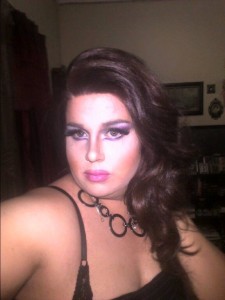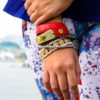Transgender Lives Matter: Angelina
In an attempt to better understand the lived experiences of transgender (in the broadest sense) people from around the world I have been doing a series of interviews with people from all over the world, asking them a common set of questions to understand who they are, what they experience on a daily basis and how they interact with the wider world. I hope that the following set of profiles will illuminate our shared experiences and also expose us all to new and different world views. This is the second in the series and today we are getting to know someone from my hometown of Johannesburg a bit better.
Angelina Monroe is a part time drag queen, who identifies as a female trapped in a male body. She lives in Johannesburg, South Africa. She would like to transition at some time and does drag as often as she possibly can as that is the only way that she can express the feminine side of her personality. Her female persona is thus expressed ‘part-time’ and she wishes she had more opportunity to express her feminine side.

Angelina is generally positive about being a drag queen and transgender woman in Johannesburg. She sees her open minded fellow citizens, her wonderfully supportive family and her friends as the best parts of her life in Johannesburg. She clearly has a very good support group around her and her family and transgender and drag queen friends are at the core of this group.
‘Blatant discrimination in our government towards transgender women’, men who see drag queens and transwomen as little more than sex objects and the fact that many people erroneously think that it is acceptable to quiz a transgender person about their genitalia, are Angelina’s top concerns for transgender people living in Johannesburg.
These concerns, particularly the issues raised regarding governmental discrimination, provide us with an interesting insight into some of the contradictions of life in South Africa The South African laws and constitution in relation to LGBT rights are amongst the most progressive in the world when it comes to gender, sexuality and sexual orientation. The constitution specifically precludes any forms of gender or sexuality based discrimination in the workplace, in society at large or by government. South Africa was one of the first countries to legalise same sex marriage and in general this area of the law is well provided for. However there are as always problems.
South African society is by and large far less liberal than its constitution. Many people remain trans and homophobic. Some butch lesbians/transmen continue to suffer ‘corrective rape’ and murdered by men who are threatened by this subversion of sexuality and gender roles. Also many people who may have been discriminated against find it hard to enforce their rights unless they have access to lawyers and other services that can force the state to act in accordance with the law.
South Africa has many issues, poverty, gender violence, poorly functioning government departments and a fledgling democracy that needs protection. In this context many people who could be relied upon in other societies to protect rights (the media, non-governmental organisations, civil society etc) are simply overwhelmed trying to do what they can for those who are desperate (lacking food, shelter and education). Sometimes they will need to prioritise who they will assist and I think that they decide that relatively privileged people (those with food and shelter) and with problems that seem less pressing get overlooked in favour of those with more pressing needs.
Finally government is ultimately effected by people. If the people charged with executing laws, policies and procedures do not ‘buy into’ these laws then they will find all sorts of ways of frustrating the applicant. Delays, lost paperwork, misinterpreted requirements and generally bad attitudes are all very effective deterrents that work against our community accessing the rights and services that are owed to them. This can be very frustrating and highly problematic. As long as our societal values lag our legal framework we will have these problems.
Despite many Johannesburgers being open minded and tolerant, Angelina is very concerned about her safety. Not all areas of Johannesburg are equally safe and intolerance and violence are very real threats. The discrimination experienced by transgender people from government officials and even employers despite the legal protections outlined above are also of deep concern to Angelina.
Transgender people often have difficulty getting their identity documents changed to match their genders (despite the process being clearly outlined). Whilst others suffer discrimination in the workplace. Of course being transgender also has implications for one’s romantic vardenafil 20 mg life and it can be hard for people to form loving relationships especially when ‘being transgender’ is so poorly misunderstood in society in general. Even some elements of the LGBT community lack a good understanding of what it is to be a transgender person.
Angelina fervently hopes that the transgender community in South Africa can achieve equality and fairness. She says ‘we deserve to be treated like human beings, just like everybody else’. This clearly indicates that Angelina feels discriminated against.
Angelina thinks Johannesburg is a great place to be a drag queen or transgender person. She has unfortunately come across people in Johannesburg who have told her that identifying as transgender and being a drag queen are mutually exclusive, but she refutes this (actually she says ‘bullshit’ to this) ‘I am who I am and I will do what I do until I can do something else’ is her take on the subject.
Angelina is well and truly ‘out’. She used ‘Coming Out Day’ in 2015 as an opportunity to tell every single person she is connected to (with the exception of her grandparents) via Facebook that she is a transgender person. She was humbled by the overwhelming support she received from so many people, some of whom she did not expect to have positive responses from. Her mother seems to have accepted that Angelina will transition at some point as she speaks of her ‘future daughter’ when talking about Angelina (which is kind of cool).
Angelina believes that South Africa needs more support structures for the transgender community. Too many support groups are based in the main metropolitan centres and it is hard for people to access them. Also, the cost of transitioning is very high and the state system is unable to meet the demand for this. It would be very helpful if the private medical aid system would fund this process somehow, which they currently seem unable or unwilling to do.
Sadly Angelina has experienced verbal abuse from transphobic sectors of society. She says she has learned to laugh these off (literally) as the words have lost the power to hurt her. She did not report these incidents to the police as she believes that the police will not do anything (in fairness many South Africans feel this way about all crime, ranging from pick pocketing to burglary, not just hate crimes). She says that some law enforcement officials are helpful but others are less so as they lack training, knowledge and information about transgender people. Some may even consider transwomen to be witches.
Angelina is hopeful that the increased coverage of transgender people in the mainstream media will raise awareness of transgender issues throughout society.
Angelina is very positive about the transgender community where she lives. She has found people to be very welcoming, warm and hospitable. Apart from regular face to face meetings at bars and night clubs, social media is a great way for Angelina to stay in touch with the rest of her community. Despite some petty rivalries and jealousies, the community is very friendly and supportive of each other and Angelina feels very supported, safe and protected in this community.
Angelina has no problem shopping, interacting socially and generally doing ‘normal’ everyday things en femme. She is not sure how much of this is down to her ability to ‘pass’ as a woman or how much is due to society’s acceptance of her as a transwoman.
Angelina is very happy being a transwoman. She loves the makeup, clothes, hair etc that all make ‘Angelina come to life’. She does however have difficulty finding shoes that fit her correctly.
Angelina is happy to see that more and more transwomen are finding the courage to come out in public and express themselves in this way. She thinks that it is much easier for some people to come out in Johannnesburg than it is for others. It all depends on what access the person has to information and resources. Clearly there is a need for people to get access to these information and support. The rest of the LGBT community treats transgender people very well and they are very accepting of the transgender community.
Angelina’s last words for us are: ‘as corny as this is going to sound I hope that one day all of us gay, straight, trans, bisexual, white ,black, Asian etc can all live together on this wonderful planet and give each other the love and acceptance every single one of us so richly deserves’ Wise words indeed.



